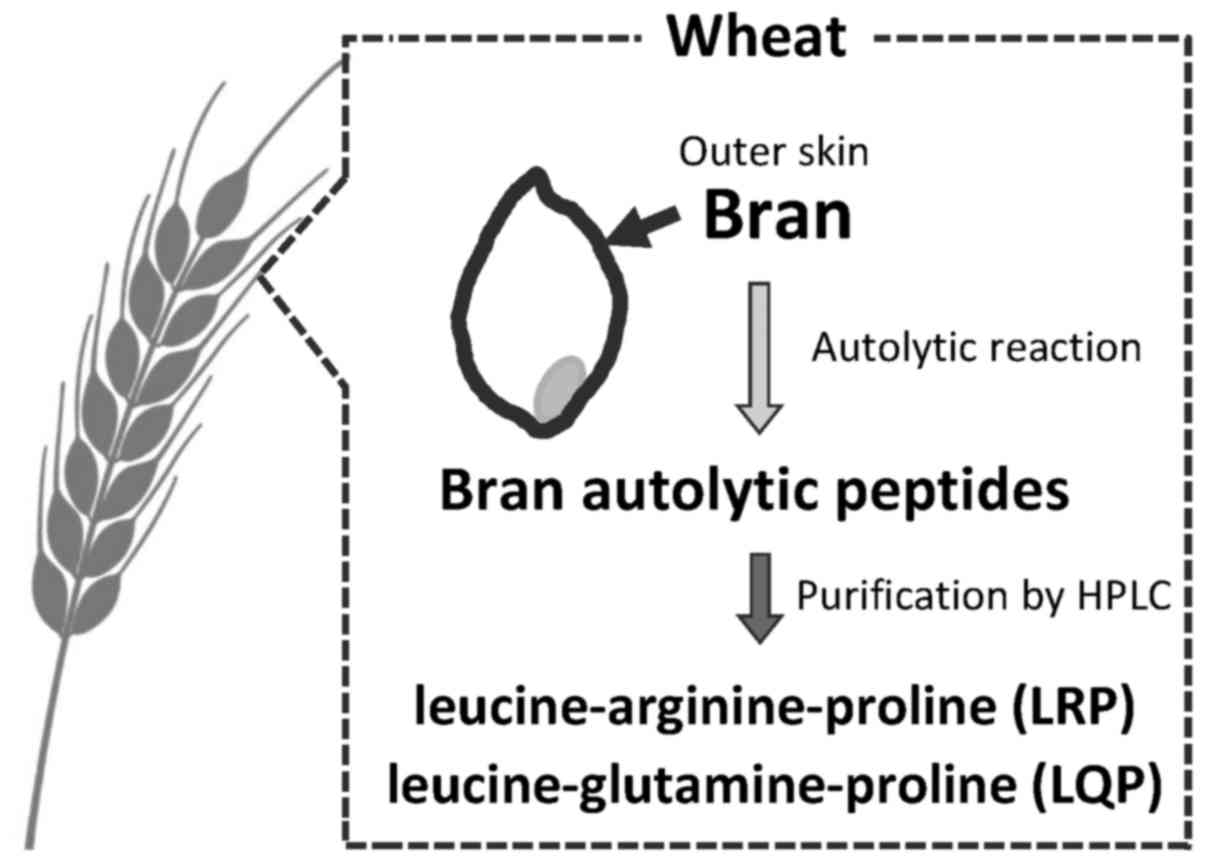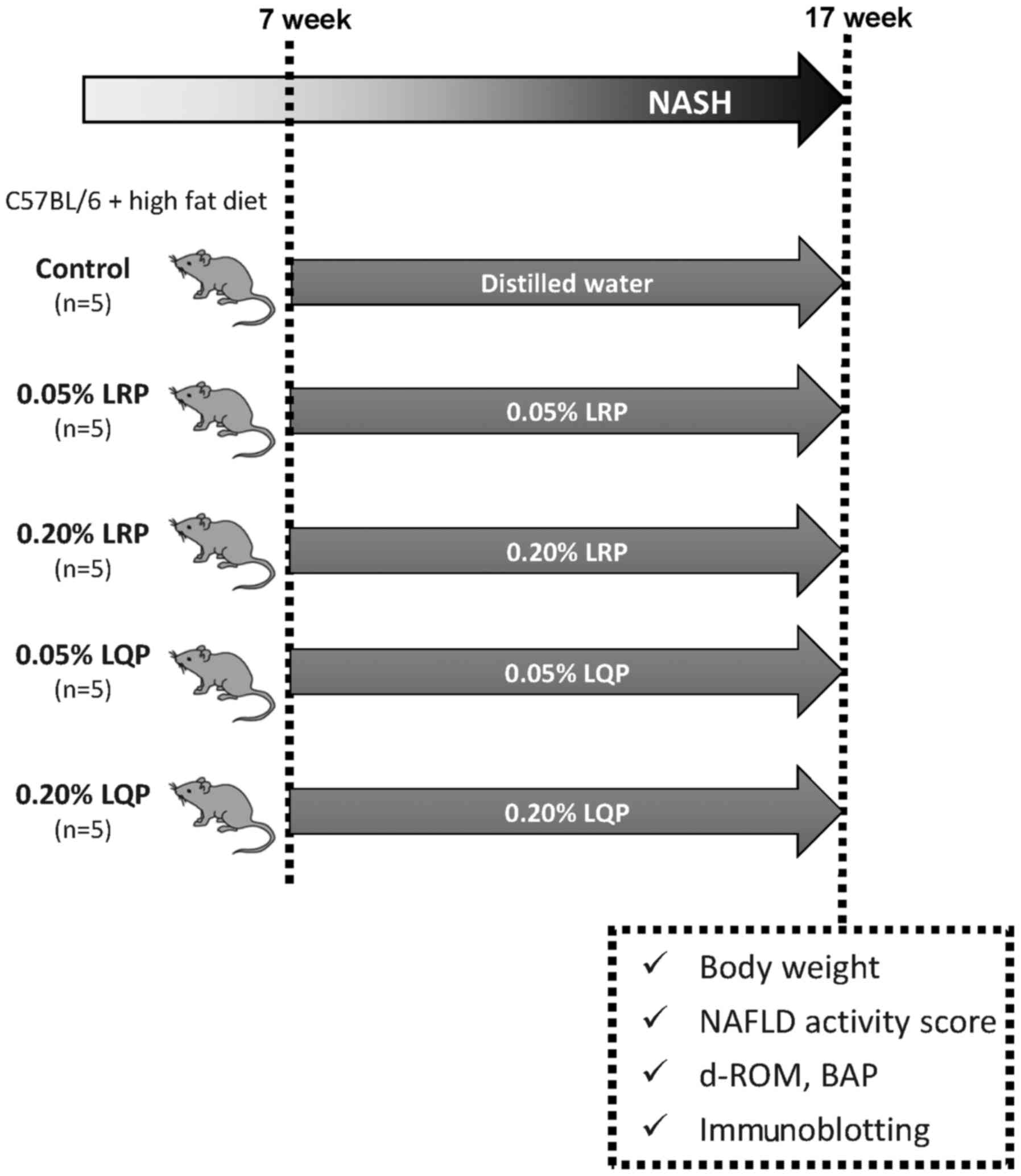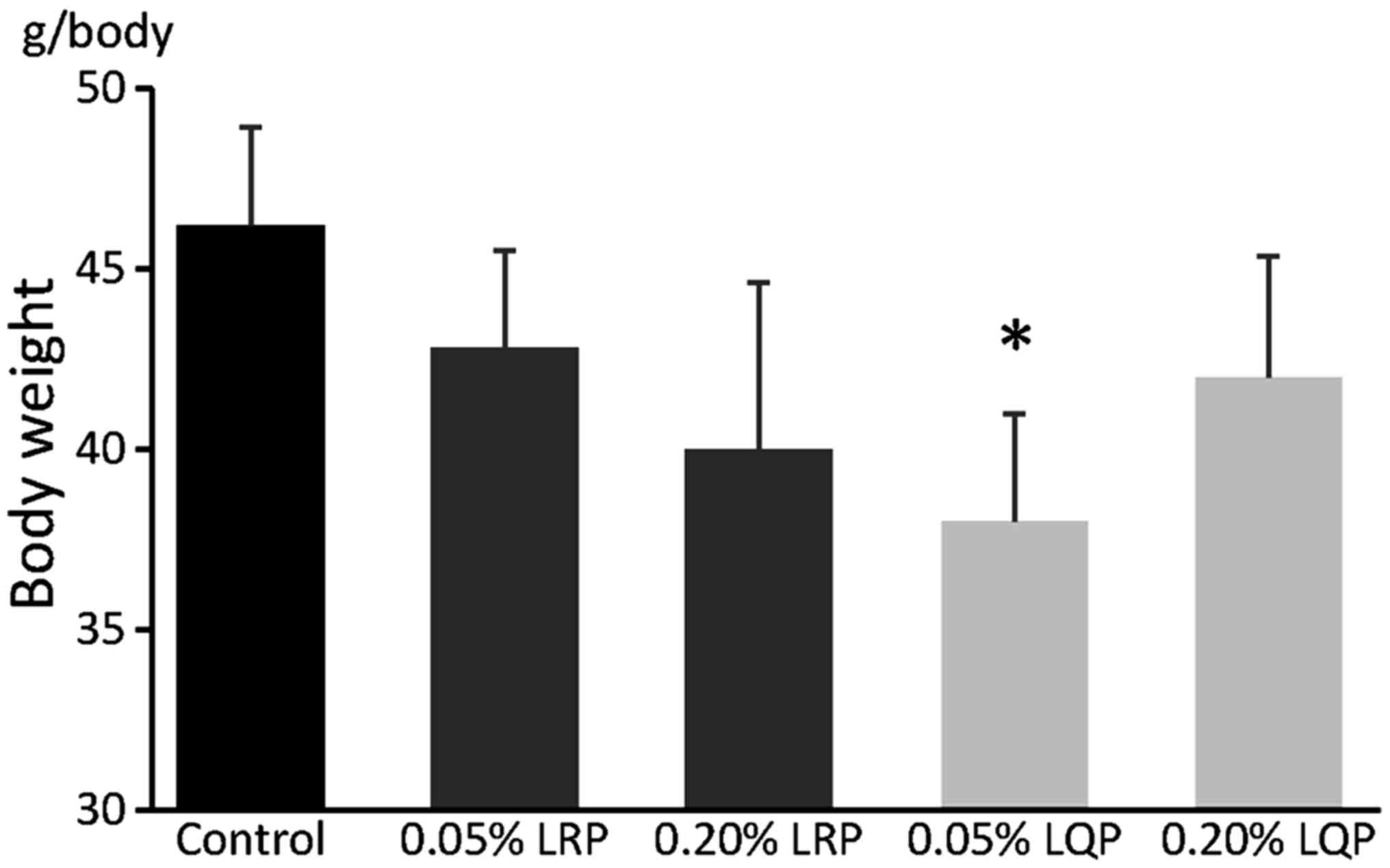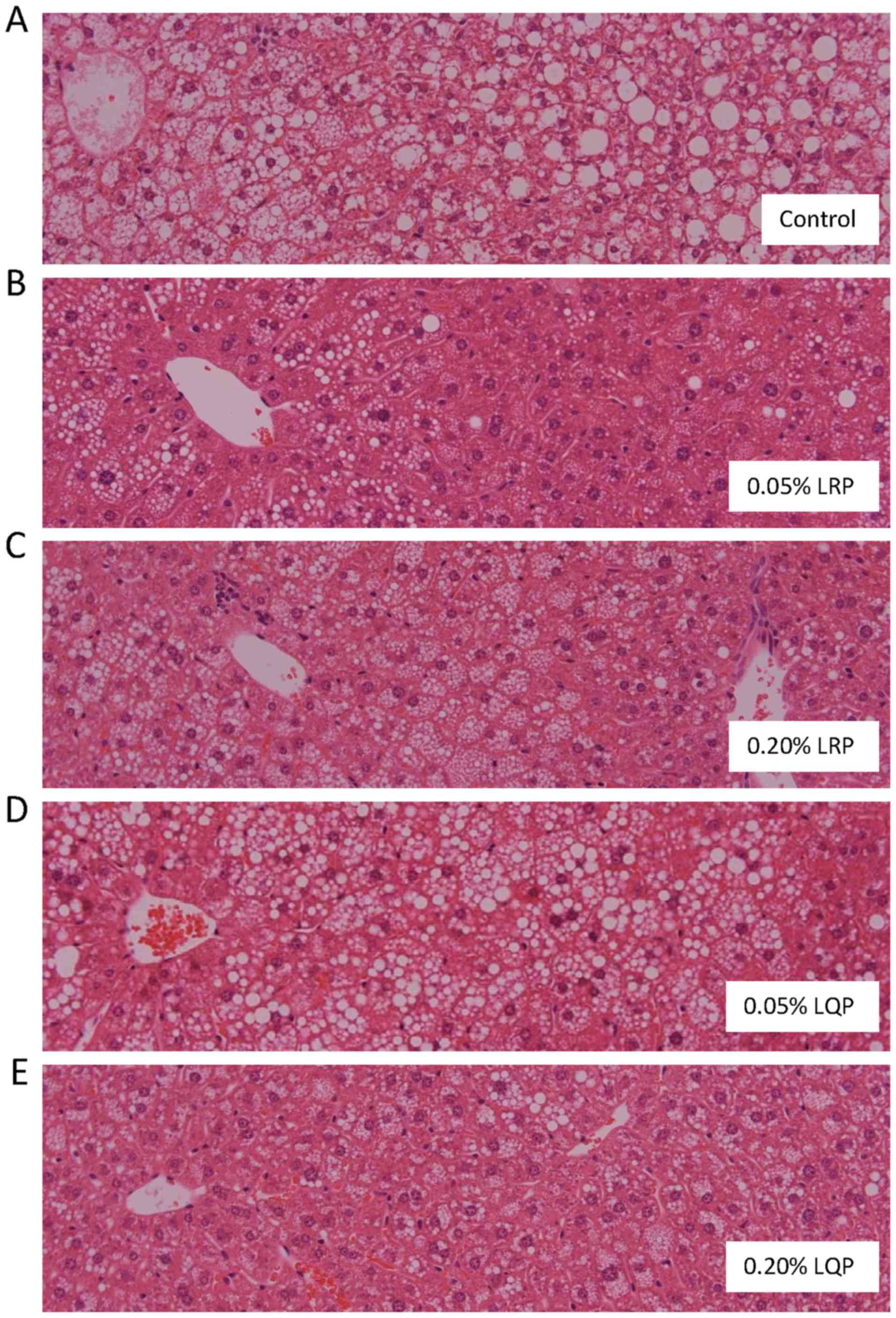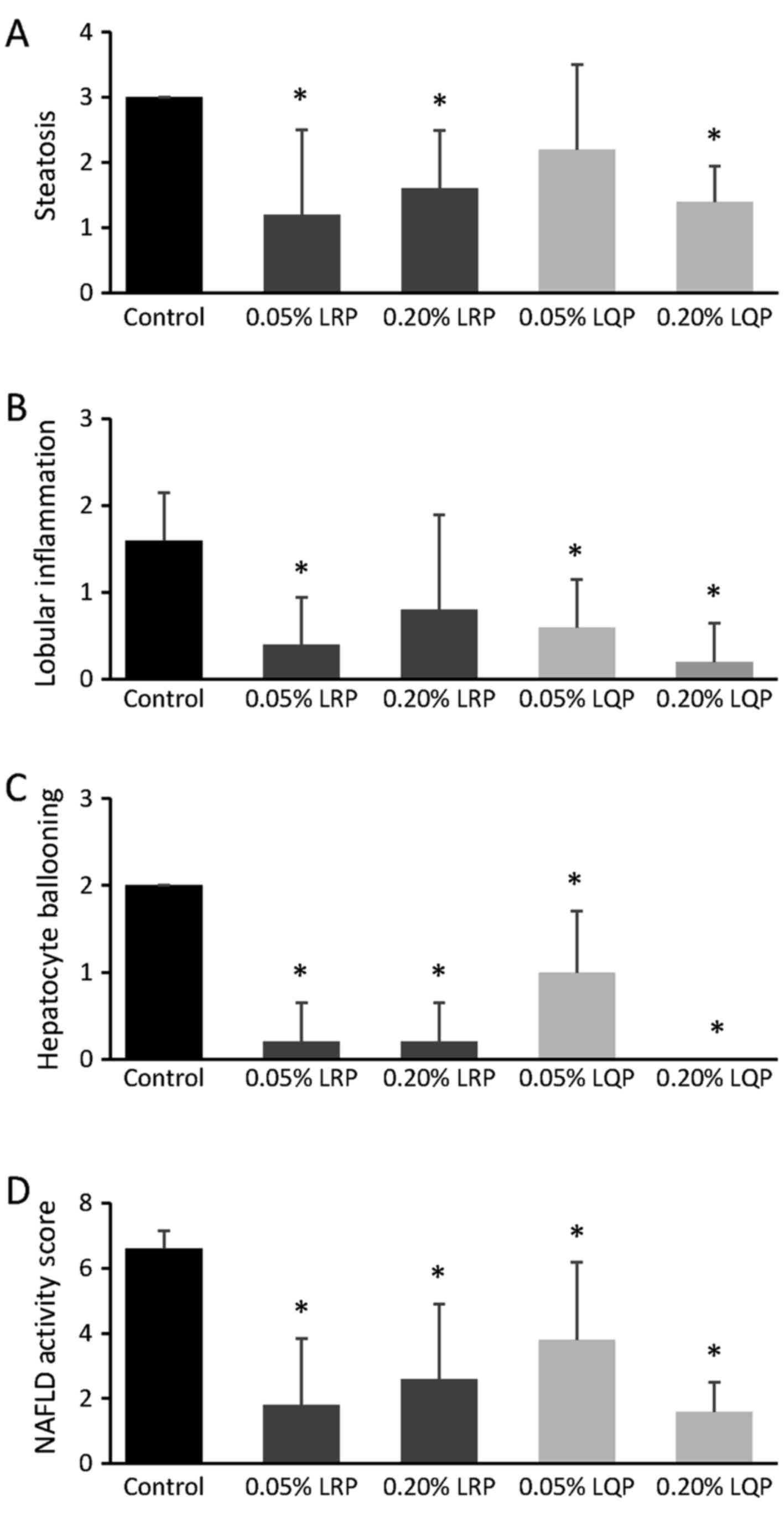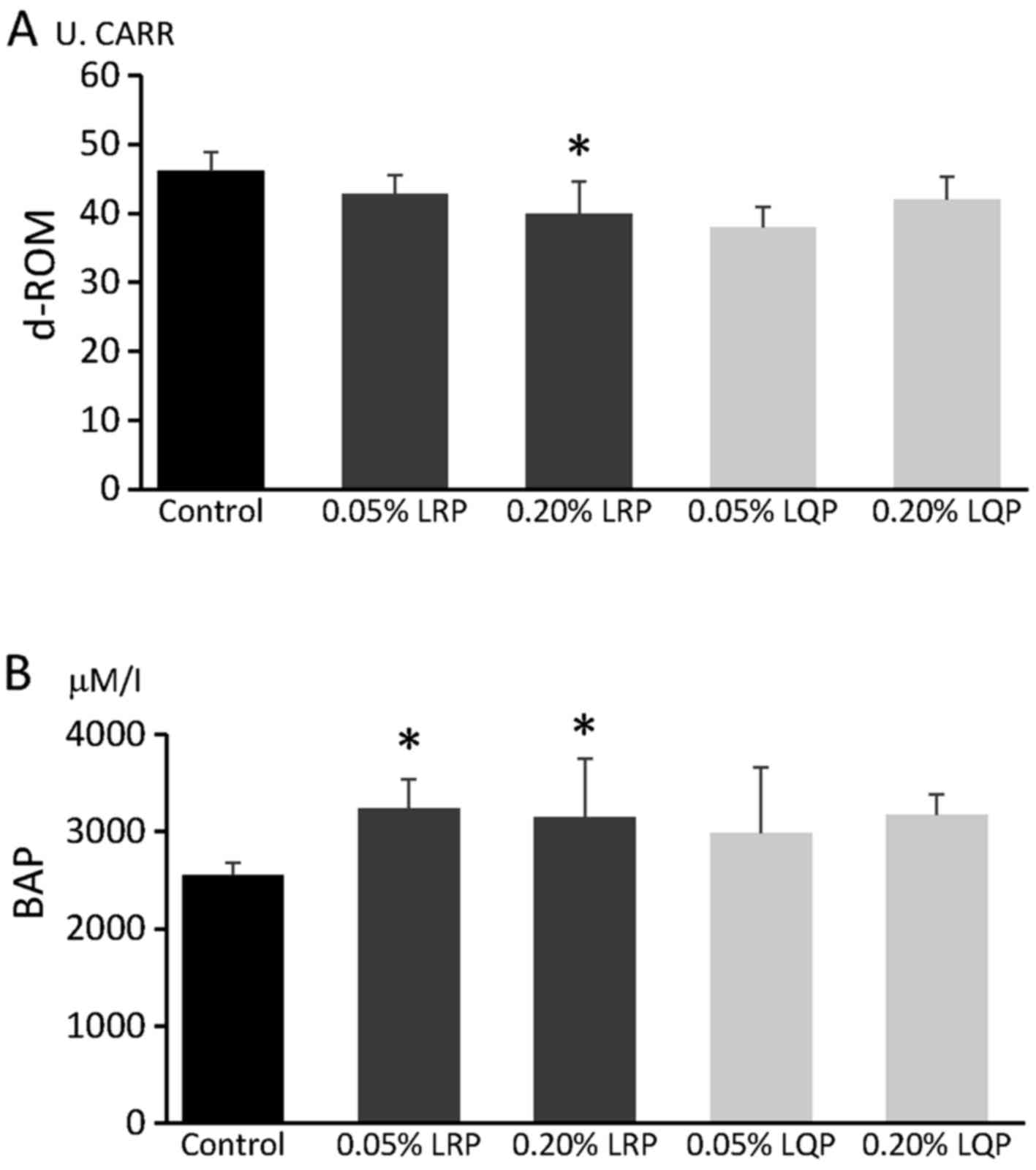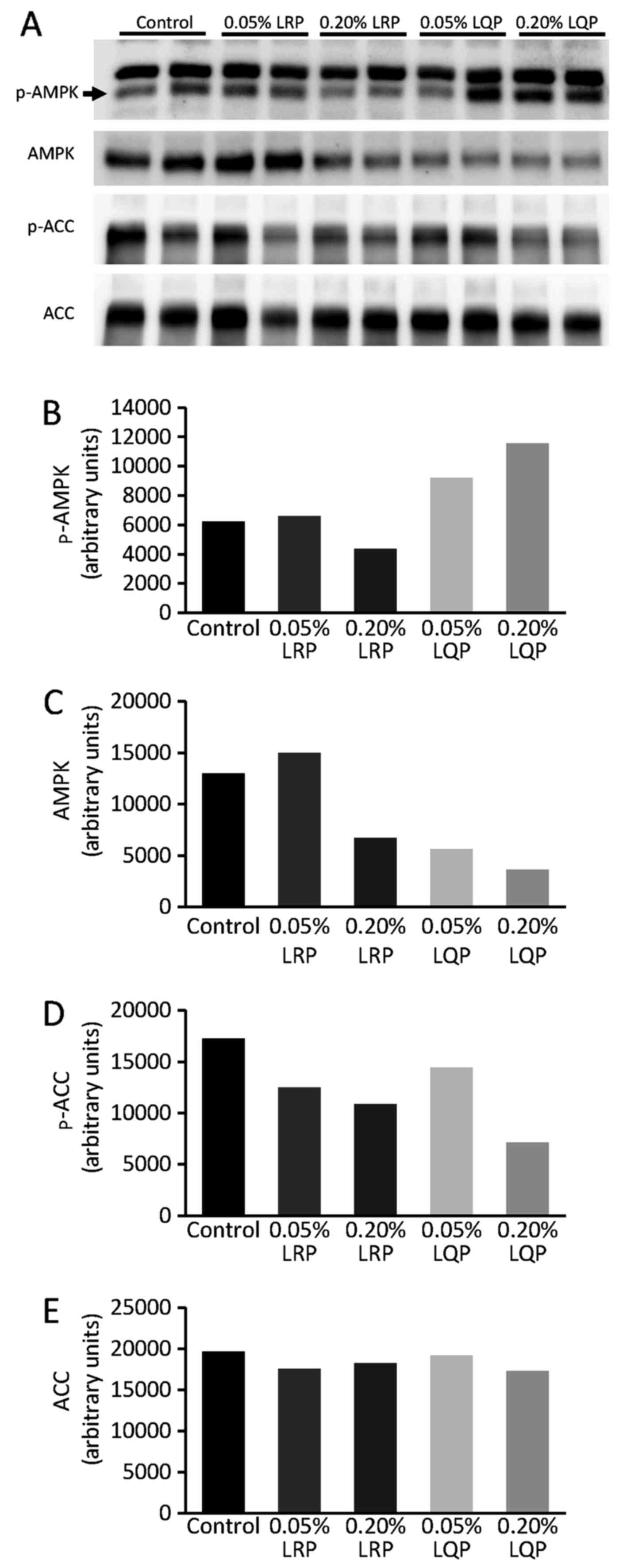|
1
|
Eguchi Y, Hyogo H, Ono M, Mizuta T, Ono N,
Fujimoto K, Chayama K and Saibara T; JSG-NAFLD: Prevalence and
associated metabolic factors of nonalcoholic fatty liver disease in
the general population from 2009 to 2010 in Japan: A multicenter
large retrospective study. J Gastroenterol. 47:586–595. 2012.
View Article : Google Scholar : PubMed/NCBI
|
|
2
|
Wree A, Broderick L, Canbay A, Hoffman HM
and Feldstein AE: From NAFLD to NASH to cirrhosis - new insights
into disease mechanisms. Nat Rev Gastroenterol Hepatol. 10:627–636.
2013. View Article : Google Scholar : PubMed/NCBI
|
|
3
|
Younossi ZM, Koenig AB, Abdelatif D, Fazel
Y, Henry L and Wymer M: Global epidemiology of non-alcoholic fatty
liver disease-meta-analytic assessment of prevalence, incidence and
outcomes. Hepatology. 64:73–84. 2016. View Article : Google Scholar
|
|
4
|
Hashimoto E and Tokushige K: Prevalence,
gender, ethnic variations, and prognosis of NASH. J Gastroenterol.
46(Suppl 1): 63–69. 2011. View Article : Google Scholar
|
|
5
|
Tokushige K, Hashimoto E and Kodama K:
Hepatocarcinogenesis in non-alcoholic fatty liver disease in Japan.
J Gastroenterol Hepatol. 28(Suppl 4): 88–92. 2013. View Article : Google Scholar : PubMed/NCBI
|
|
6
|
Baffy G, Brunt EM and Caldwell SH:
Hepatocellular carcinoma in non-alcoholic fatty liver disease: An
emerging menace. J Hepatol. 56:1384–1391. 2012. View Article : Google Scholar : PubMed/NCBI
|
|
7
|
Nobili V, Manco M, Devito R, Di Ciommo V,
Comparcola D, Sartorelli MR, Piemonte F, Marcellini M and Angulo P:
Lifestyle intervention and antioxidant therapy in children with
nonalcoholic fatty liver disease: A randomized, controlled trial.
Hepatology. 48:119–128. 2008. View Article : Google Scholar : PubMed/NCBI
|
|
8
|
Oza N, Eguchi Y, Mizuta T, Ishibashi E,
Kitajima Y, Horie H, Ushirogawa M, Tsuzura T, Nakashita S,
Takahashi H, et al: A pilot trial of body weight reduction for
nonalcoholic fatty liver disease with a home-based lifestyle
modification intervention delivered in collaboration with
interdisciplinary medical staff. J Gastroenterol. 44:1203–1208.
2009. View Article : Google Scholar : PubMed/NCBI
|
|
9
|
Belfort R, Harrison SA, Brown K, Darland
C, Finch J, Hardies J, Balas B, Gastaldelli A, Tio F, Pulcini J, et
al: A placebo-controlled trial of pioglitazone in subjects with
nonalcoholic steatohepatitis. N Engl J Med. 355:2297–2307. 2006.
View Article : Google Scholar : PubMed/NCBI
|
|
10
|
Sumie S, Kawaguchi T, Kawaguchi A,
Kuromatsu R, Nakano M, Satani M, Yamada S, Okamura S, Yonezawa Y,
Kakuma T, et al: Effect of pioglitazone on outcome following
curative treatment for hepatocellular carcinoma in patients with
hepatitis C virus infection: A prospective study. Mol Clin Oncol.
3:115–120. 2015.
|
|
11
|
Sanyal AJ, Chalasani N, Kowdley KV,
McCullough A, Diehl AM, Bass NM, Neuschwander-Tetri BA, Lavine JE,
Tonascia J, Unalp A, et al NASH CRN: Pioglitazone, vitamin E, or
placebo for nonalcoholic steatohepatitis. N Engl J Med.
362:1675–1685. 2010. View Article : Google Scholar : PubMed/NCBI
|
|
12
|
Lavine JE, Schwimmer JB, Van Natta ML,
Molleston JP, Murray KF, Rosenthal P, Abrams SH, Scheimann AO,
Sanyal AJ, Chalasani N, et al Nonalcoholic Steatohepatitis Clinical
Research Network: Effect of vitamin E or metformin for treatment of
nonalcoholic fatty liver disease in children and adolescents: The
TONIC randomized controlled trial. JAMA. 305:1659–1668. 2011.
View Article : Google Scholar : PubMed/NCBI
|
|
13
|
Miller ER III, Pastor-Barriuso R, Dalal D,
Riemersma RA, Appel LJ and Guallar E: Meta-analysis: High-dosage
vitamin E supplementation may increase all-cause mortality. Ann
Intern Med. 142:37–46. 2005. View Article : Google Scholar
|
|
14
|
Ye EQ, Chacko SA, Chou EL, Kugizaki M and
Liu S: Greater whole-grain intake is associated with lower risk of
type 2 diabetes, cardiovascular disease, and weight gain. J Nutr.
142:1304–1313. 2012. View Article : Google Scholar : PubMed/NCBI
|
|
15
|
Vetrani C, Costabile G, Luongo D, Naviglio
D, Rivellese AA, Riccardi G and Giacco R: Effects of whole-grain
cereal foods on plasma short chain fatty acid concentrations in
individuals with the metabolic syndrome. Nutrition. 32:217–221.
2016. View Article : Google Scholar
|
|
16
|
Bosello O, Ostuzzi R, Armellini F,
Micciolo R and Scuro LA: Glucose tolerance and blood lipids in
bran-fed patients with impaired glucose tolerance. Diabetes Care.
3:46–49. 1980. View Article : Google Scholar : PubMed/NCBI
|
|
17
|
Brodribb AJ and Humphreys DM: Diverticular
disease: Three studies. Part III - Metabolic effect of bran in
patients with diverticular disease. Br Med J. 1:428–430. 1976.
View Article : Google Scholar : PubMed/NCBI
|
|
18
|
Nogata Y, Nagamine T, Yanaka M and Ohta H:
Angiotensin I converting enzyme inhibitory peptides produced by
autolysis reactions from wheat bran. J Agric Food Chem.
57:6618–6622. 2009. View Article : Google Scholar : PubMed/NCBI
|
|
19
|
Fiordaliso F, Cuccovillo I, Bianchi R, Bai
A, Doni M, Salio M, De Angelis N, Ghezzi P, Latini R and Masson S:
Cardiovascular oxidative stress is reduced by an ACE inhibitor in a
rat model of streptozotocin-induced diabetes. Life Sci. 79:121–129.
2006. View Article : Google Scholar : PubMed/NCBI
|
|
20
|
Privratsky JR, Wold LE, Sowers JR, Quinn
MT and Ren J: AT1 blockade prevents glucose-induced cardiac
dysfunction in ventricular myocytes: Role of the AT1 receptor and
NADPH oxidase. Hypertension. 42:206–212. 2003. View Article : Google Scholar : PubMed/NCBI
|
|
21
|
Zarfeshani A, Ngo S and Sheppard AM:
Leucine alters hepatic glucose/lipid homeostasis via the
myostatin-AMP-activated protein kinase pathway - potential
implications for nonalcoholic fatty liver disease. Clin
Epigenetics. 6:272014. View Article : Google Scholar : PubMed/NCBI
|
|
22
|
Mantena SK, Vaughn DP Jr, Andringa KK,
Eccleston HB, King AL, Abrams GA, Doeller JE, Kraus DW,
Darley-Usmar VM and Bailey SM: High fat diet induces dysregulation
of hepatic oxygen gradients and mitochondrial function in vivo.
Biochem J. 417:183–193. 2009. View Article : Google Scholar :
|
|
23
|
Kawaguchi T, Sakisaka S, Sata M, Mori M
and Tanikawa K: Different lobular distributions of altered
hepatocyte tight junctions in rat models of intrahepatic and
extrahepatic cholestasis. Hepatology. 29:205–216. 1999. View Article : Google Scholar
|
|
24
|
Kawaguchi T, Sakisaka S, Mitsuyama K,
Harada M, Koga H, Taniguchi E, Sasatomi K, Kimura R, Ueno T, Sawada
N, et al: Cholestasis with altered structure and function of
hepatocyte tight junction and decreased expression of canalicular
multispecific organic anion transporter in a rat model of colitis.
Hepatology. 31:1285–1295. 2000. View Article : Google Scholar : PubMed/NCBI
|
|
25
|
Kawaguchi T, Itou M, Taniguchi E and Sata
M: Exendin 4, a glucagon like peptide 1 receptor agonist, modulates
hepatic fatty acid composition and Δ5 desaturase index in a murine
model of non alcoholic steatohepatitis. Int J Mol Med. 34:782–787.
2014.PubMed/NCBI
|
|
26
|
Kleiner DE, Brunt EM, Van Natta M, Behling
C, Contos MJ, Cummings OW, Ferrell LD, Liu YC, Torbenson MS,
Unalp-Arida A, et al Nonalcoholic Steatohepatitis Clinical Research
Network: Design and validation of a histological scoring system for
nonalcoholic fatty liver disease. Hepatology. 41:1313–1321. 2005.
View Article : Google Scholar : PubMed/NCBI
|
|
27
|
Korenaga M, Nishina S, Korenaga K,
Tomiyama Y, Yoshioka N, Hara Y, Sasaki Y, Shimonaka Y and Hino K:
Branched-chain amino acids reduce hepatic iron accumulation and
oxidative stress in hepatitis C virus polyprotein-expressing mice.
Liver Int. 35:1303–1314. 2015. View Article : Google Scholar :
|
|
28
|
Tanito M, Kaidzu S, Takai Y and Ohira A:
Status of systemic oxidative stresses in patients with primary
open-angle glaucoma and pseudoexfoliation syndrome. PLoS One.
7:e496802012. View Article : Google Scholar : PubMed/NCBI
|
|
29
|
Kawaguchi T, Yoshida T, Harada M, Hisamoto
T, Nagao Y, Ide T, Taniguchi E, Kumemura H, Hanada S, Maeyama M, et
al: Hepatitis C virus downregulates insulin receptor substrates 1
and 2 through upregulation of suppressor of cytokine signaling 3.
Am J Pathol. 165:1499–1508. 2004. View Article : Google Scholar : PubMed/NCBI
|
|
30
|
Kawaguchi T, Ide T, Taniguchi E, Hirano E,
Itou M, Sumie S, Nagao Y, Yanagimoto C, Hanada S, Koga H, et al:
Clearance of HCV improves insulin resistance, beta-cell function,
and hepatic expression of insulin receptor substrate 1 and 2. Am J
Gastroenterol. 102:570–576. 2007. View Article : Google Scholar : PubMed/NCBI
|
|
31
|
Schneider CA, Rasband WS and Eliceiri KW:
NIH Image to ImageJ: 25 years of image analysis. Nat Methods.
9:671–675. 2012. View Article : Google Scholar : PubMed/NCBI
|
|
32
|
Marchesini G, Petta S and Dalle Grave R:
Diet, weight loss, and liver health in nonalcoholic fatty liver
disease: Pathophysiology, evidence, and practice. Hepatology.
63:2032–2043. 2016. View Article : Google Scholar
|
|
33
|
Albano E, Mottaran E, Occhino G, Reale E
and Vidali M: Review article: Role of oxidative stress in the
progression of non-alcoholic steatosis. Aliment Pharmacol Ther.
22(Suppl 2): 71–73. 2005. View Article : Google Scholar : PubMed/NCBI
|
|
34
|
Ni X and Wang H: Silymarin attenuated
hepatic steatosis through regulation of lipid metabolism and
oxidative stress in a mouse model of nonalcoholic fatty liver
disease (NAFLD). Am J Transl Res. 8:1073–1081. 2016.PubMed/NCBI
|
|
35
|
Maeda K, Koda M, Matono T, Sugihara T,
Yamamoto S, Ueki M, Murawaki Y, Yamashita N and Nishiyama S:
Preventive effects of ME3738 on hepatic fibrosis induced by bile
duct ligation in rats. Hepatol Res. 38:727–735. 2008. View Article : Google Scholar : PubMed/NCBI
|
|
36
|
Tomiyama Y, Nishina S, Hara Y, Kawase T
and Hino K: Hepatic oxidative stress in ovariectomized transgenic
mice expressing the hepatitis C virus polyprotein is augmented
through suppression of adenosine monophosphate-activated protein
kinase/proliferator-activated receptor gamma co-activator 1 alpha
signaling. Hepatol Res. 44:E229–E239. 2014. View Article : Google Scholar
|
|
37
|
Suzuki Y, Imai K, Takai K, Hanai T,
Hayashi H, Naiki T, Nishigaki Y, Tomita E, Shimizu M and Moriwaki
H: Hepatocellular carcinoma patients with increased oxidative
stress levels are prone to recurrence after curative treatment: A
prospective case series study using the d-ROM test. J Cancer Res
Clin Oncol. 139:845–852. 2013. View Article : Google Scholar : PubMed/NCBI
|
|
38
|
Vassalle C, Bianchi S, Battaglia D, Landi
P, Bianchi F and Carpeggiani C: Elevated levels of oxidative stress
as a prognostic predictor of major adverse cardiovascular events in
patients with coronary artery disease. J Atheroscler Thromb.
19:712–717. 2012.PubMed/NCBI
|
|
39
|
Kim JH, Baik HW, Yoon YS, Joung HJ, Park
JS, Park SJ, Jang EJ, Park SW, Kim SJ, Kim MJ, et al: Measurement
of antioxidant capacity using the biological antioxidant potential
test and its role as a predictive marker of metabolic syndrome.
Korean J Intern Med. 29:31–39. 2014. View Article : Google Scholar : PubMed/NCBI
|
|
40
|
Fu L, Bruckbauer A, Li F, Cao Q, Cui X, Wu
R, Shi H, Zemel MB and Xue B: Interaction between metformin and
leucine in reducing hyperlipidemia and hepatic lipid accumulation
in diet-induced obese mice. Metabolism. 64:1426–1434. 2015.
View Article : Google Scholar : PubMed/NCBI
|
|
41
|
Fu L, Li F, Bruckbauer A, Cao Q, Cui X, Wu
R, Shi H, Xue B and Zemel MB: Interaction between leucine and
phosphodiesterase 5 inhibition in modulating insulin sensitivity
and lipid metabolism. Diabetes Metab Syndr Obes. 8:227–239.
2015.PubMed/NCBI
|















